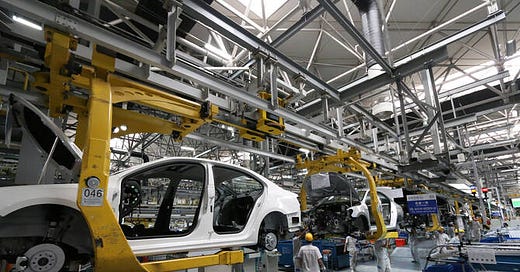Chinese EVs capturing huge market share in MENA, including Israel; infrastructure contract in Morocco; construction contract in Iraq; renewable energy research partnership in Oman
Chinese carmakers to capture 34% of MEA market by 2030 - Arab News.
Chinese automotive brands are expected to achieve a market share of 34 percent in the Middle East and Africa region by 2030, marking a rise from 10 percent in 2024, according to an analysis.
In its latest report, global consulting firm AlixPartners stated that the MEA region will hold the highest share of vehicles produced by the Asian country outside of China, Russia, and Belarus by the end of the decade.
The projections align with findings published in November by media intelligence firm CARMA, which revealed that car buyers in countries such as Saudi Arabia and the UAE show trust levels above 70 percent for Chinese automotive brands — more than double the confidence seen in the US.
Chinese brands lead Israel's imported car sales in early 2025 - Xinhua.
Chinese automakers accounted for the largest share of Israel's imported passenger car sales in the first four months of 2025, selling 30,478 electric and gasoline vehicles, data from the Israel Vehicle Importers Association showed on Sunday.
South Korea and Japan ranked as Israel's second- and third-largest suppliers of imported cars during the period, the association said, without disclosing specific figures for those markets.
BYD Auto led electric vehicle (EV) sales in Israel, delivering 3,215 units between January and April, driven by its subcompact crossover Atto 3 and the mid-size Seal U SUV. Rival Chinese automaker Xpeng Motor secured the second spot with 2,705 EVs sold across three models. MG Motor, a Chinese-owned British brand, placed third with 1,693 EVs sold.
Chinese automakers dominated Israel's EV market during the four-month span, capturing more than 80 percent of total electric car sales with 16,034 units delivered. Gasoline-powered vehicles from Chinese brands accounted for the remainder of the 30,478 total sales.
Omani and Chinese R&D entities to study hydrogen liquefaction - Zawya.
The Sustainable Energy Research Centre (SERC), a prominent Omani research facility based at Sultan Qaboos University (SQU), has announced a partnership with China’s SinoScience Clean Energy Technology Co Ltd, with the aim of identifying technologies that will enable the liquefaction of green hydrogen for export.
SinoScience, headquartered in the Chinese province of Henan, oversees a network of research institutes operating in a number of Chinese cities. The company specialises in the research and development, manufacturing, and industrial chain operation of key technologies and core equipment in the field of cryogenics, including hydrogen and helium liquefaction.
Under a consultancy study signed by the two sides recently, SERC will partner with the Chinese firm in ‘Unlocking the Potential of Liquefaction Technology for Oman’s Green Hydrogen Exportation’.
Morocco, China firms win $152mln rail tunnel deal - Zawya.
Morocco has awarded a project to build a 3.3-kilometre underground rail tunnel to a consortium comprising a local firm and a Chinese company.
The rail which runs under Rabat city will be connected to the planned high-speed network linking the North-Western cities of Marrakesh and Kenitra.
In a report on Monday, the Arabic language daily Sabah Akadir said the project has been awarded to an alliance of Moroccan SGTM Company and Sinohydro Bureau 5 of China, adding that the project cost is around $152 million.
Morocco has been locked in a massive construction drive involving its rail, air and road transport networks as it braces to co-host FIFA World Cup games in 2030.
Iraq asks Chinese firm to start Al-Sadr city project - Zawya.
Iraq has asked the Chinese Shandong Construction company to start a project to build the new Al-Sadr City near the capital Baghdad.
Prime Minister Mohammed Al-Sudani, who headed a meeting of the project’s committee on Sunday, directed members to contact the Company to launch the project.
“Sudani gave instructions for the Chinese contractor to embark on the project after it completed its design,” the official Iraqi news agency said.
In early 2025, Iraqi officials said Shandong has been awarded Al-Sadr project, which includes the construction of nearly 11,000 houses.
Nearly 49,000 more houses are planned in Phase 2 of the project, one of several residential schemes planned by Iraq to tackle a persistent housing supply crisis.




